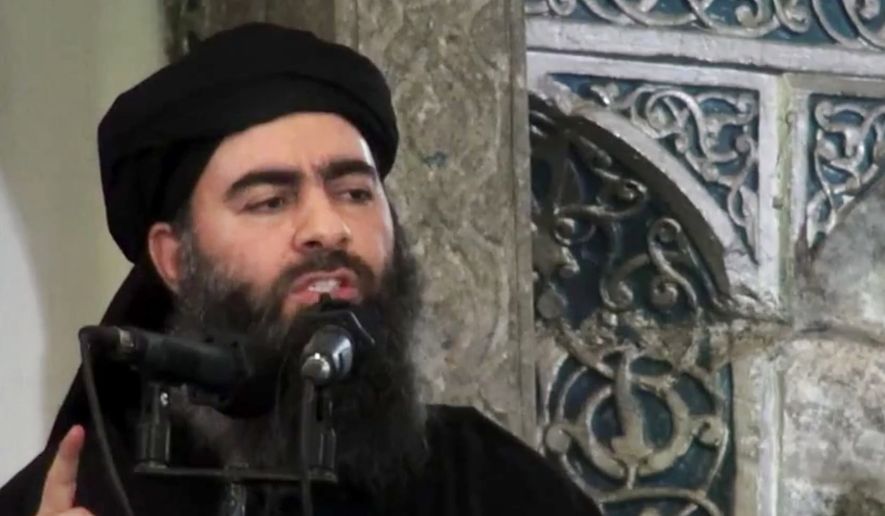The Islamic State group’s elusive leader, Abu Bakr al-Baghdadi, is reportedly alive but flushed from his stronghold in the Iraqi city of Mosul, largely sidelined in the fight against the U.S.-backed forces battling to oust the terrorist organization from its Iraqi and Syrian strongholds.
U.S. and Iraqi defense officials, in their most expansive comments to date on al-Baghdadi’s fate, described an isolated commander hiding in the desert and focused largely on his own survival, a sharp contrast to the charismatic jihadi preacher who barely more than a year ago ruled a “caliphate” that stretched from central Syria to the outskirts of Baghdad.
Aside from issuing general edicts on how Islamic State forces should defend Mosul and Raqqa, the Syrian city that was to be the caliphate’s de facto capital, al-Baghdadi and his closest lieutenants “are not exercising any tactical influence” in either fight, a U.S. defense official told reporters Wednesday.
Iraqi sources said al-Baghdadi, an Iraqi whose real name is Ibrahim al-Samarrai, has relocated to a stretch of desert lightly populated by Sunni Arab tribes north of the Euphrates River.
That lack of leadership from the upper echelons of the Islamic State, coupled with the aggressive targeting of midlevel leaders and ground commanders, has created confusion among rank-and-file fighters holding out in Mosul and Raqqa, the official told reporters at the Pentagon, speaking on background.
That confusion has been exacerbated by reports that top leaders of the Islamic State, also known as ISIS, have begun to flee Raqqa for safe havens in Deir-i-Zour, al Qaim and other areas south of the city.
“I believe ISIS leaders are leaving Raqqa,” the official said, adding that factions within the group’s leadership “may see it … from a military perspective that this may not be tenable to hold on to Raqqa.”
The Syrian Democratic Forces, the U.S.-backed coalition of Kurdish and Arab paramilitary fighters, are closing in on Raqqa just as Turkish troops and Russian-backed Syrian forces are positioning themselves to rid Syria of the Islamic State.
Given the jockeying by regional powers in northern Syria, along with the Islamic State’s efforts to reconsolidate its forces in the country, U.S. commanders are raising the prospect that the liberation of Raqqa may not be the knockout blow that Washington is seeking. Many analysts also warn that the Islamic State will revert to classic tactics of a stateless terrorist network even if it loses its territorial base.
“Raqqa will probably not be the final battle against ISIS. It will be a critical one” but not the back-breaking defeat sought by the Trump administration, the official said.
President Trump has ordered a thorough 30-day review of the Pentagon’s plans to defeat the Islamic State, and The Associated Press reported Wednesday evening that an undetermined number of U.S. Marines with heavy artillery have been deployed to Syria to join U.S. Special Forces that have been operating there.
U.S. military and intelligence officials do not know al-Baghdadi’s whereabouts, but the Defense Department was wary of characterizing the Islamic State leader as “on the run,” the official said.
The leader of the Islamic State was likely in Mosul before fleeing ahead of the Iraqi-led offensive to retake the city in October.
It was from Grand Nuri Mosque in the old city district of western Mosul that al-Baghdadi announced the group’s Islamic caliphate after overrunning much of Syria and northern Iraq in a blistering campaign in 2014. Iraqi forces are reportedly close to reclaiming control of the mosque.
The Islamic State’s spiritual leader has been publicly silent since releasing a recorded speech in November just as the Mosul campaign was starting. In that tape, he called on his followers to fight the “unbelievers” and “make their blood flow as rivers.” Islamic State propaganda, which once hailed the group’s stunning seizure of Mosul in mid-2014, now rarely mentions the city as a focus of its efforts.
But as the command structure underneath al-Baghdadi is decimated by Iraqi, U.S. and coalition forces, the Islamic State’s ability to hold sway in Iraq, Syria and elsewhere will also crumble — regardless of whether the leader himself is taken out.
“Baghdadi is not a priority for us,” the official said, noting that other governmental agencies have taken the lead in hunting down the Islamic State leader. “It’s more important for us to kill [the terrorist group’s] battlefield commanders” and continue to sow discord on the ground.
Monitoring of Islamic State communications has shown ground commanders issuing conflicting guidance on how to organize a defense of Mosul. The eastern part of the city is in Iraqi government control, and Iraqi forces are quickly advancing in the contested western half of the country’s second-largest city.
The Islamic State’s defense of the western portion of the city, which Iraqi and coalition forces breached late last month, has been “fractured and confused at times” because of the persistent focus on the group’s midlevel leadership, the official said, adding that “this is the kind of impact we expect” as the offensive continues.
The four-month campaign to liberate Mosul picked up steam Monday as the coalition suddenly closed in on a key provincial government complex in Dawasa enclave in the city’s western half, prompting a wave of optimistic projections from Iraqi commanders.
Islamic State’s defenses “are buckling under the pressure,” said Iraqi air force Cmdr. Hamid Maliki. Given the speed and relative success of the Iraqi offensive, Mosul would likely fall to Iraqi forces “within the next six weeks,” Cmdr. Maliki told Anadolu Agency on Monday.
“The game is up,” Air Force Brig. Gen. Matthew Isler told the Reuters news agency at the Qayyara West Airfield south of Mosul.
He told the news service that the remaining Islamic State fighters, primarily Iraqis, are putting up a stiff resistance but have no central command-and-control operation to coordinate their efforts.
“They have lost this fight, and what you’re seeing is a delaying action,” Gen. Isler said.
• Carlo Muñoz can be reached at cmunoz@washingtontimes.com.




Please read our comment policy before commenting.